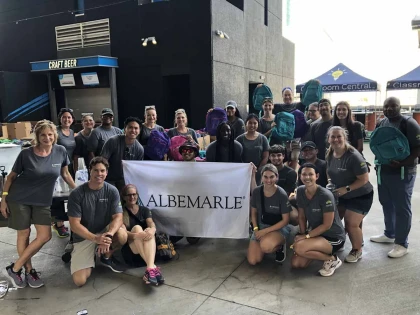Albemarle Foundation Donates Local Blood Pressure Kiosks
Albemarle Foundation Donates Local Blood Pressure Kiosks
Last year, Albemarle Foundation joined the American Heart Association to help tackle hypertension prevention in Charlotte by opening blood pressure kiosks. The self-monitoring kiosks, which were placed at the Goodwill Opportunity Campus and Camino Community Health Center, opened to the public on May 17, World Hypertension Day. "Here in Mecklenburg County, more than 240,000 people have high blood pressure, and the areas that we're targeting are some of the areas highest hit in chronic disease and lowest access to care," said Marques Fitch, vice president for health strategies at the American Heart Association.
High blood pressure is the leading cause of heart disease, stroke and kidney disease and can be linked to more than 400,000 U.S deaths, each year. Both locations for the blood pressure kiosks serve people who are at risk for hypertension and more likely to die of heart disease and stroke. Each blood pressure kiosk includes educational materials as well as a tracker so that users can record their numbers and assess their risk. “The Albemarle Foundation was first in the nation to donate a local self-monitoring blood pressure kiosk, and we were thrilled when CVS Health matched that gift making a second local kiosk possible," said Sandra Holub, Executive Director of The Albemarle Foundation and President of The Albemarle Care Fund. “A lot of consideration was put into selecting locations for the kiosks. These powerful self-management tools will serve at-risk populations and help save lives."
Research from the American Heart Association shows 44% of residents living in six Charlotte ZIP Codes have high blood pressure, compared with 27% in other neighborhoods, and studies have shown hypertension is common in African-American and Hispanic populations. Fitch said placing the blood pressure kiosks in predominantly Hispanic areas will allow people to take steps to improve their health, even if they don't have a primary-care physician. "Camino Community Center services primarily the Spanish-speaking population," said Marques. "They see about 25,000 people over the course of a year, and the machine that will be placed there will be a bilingual machine, so it will be in English and Spanish, so the population can really get the care it deserves."
According to the North Carolina State Center for Health Statistics, the biggest risk factors for hypertension can be modified by maintaining a healthy weight, getting more aerobic exercise and not smoking. Click here for information from the American Heart Association about understanding your blood pressure readings.







